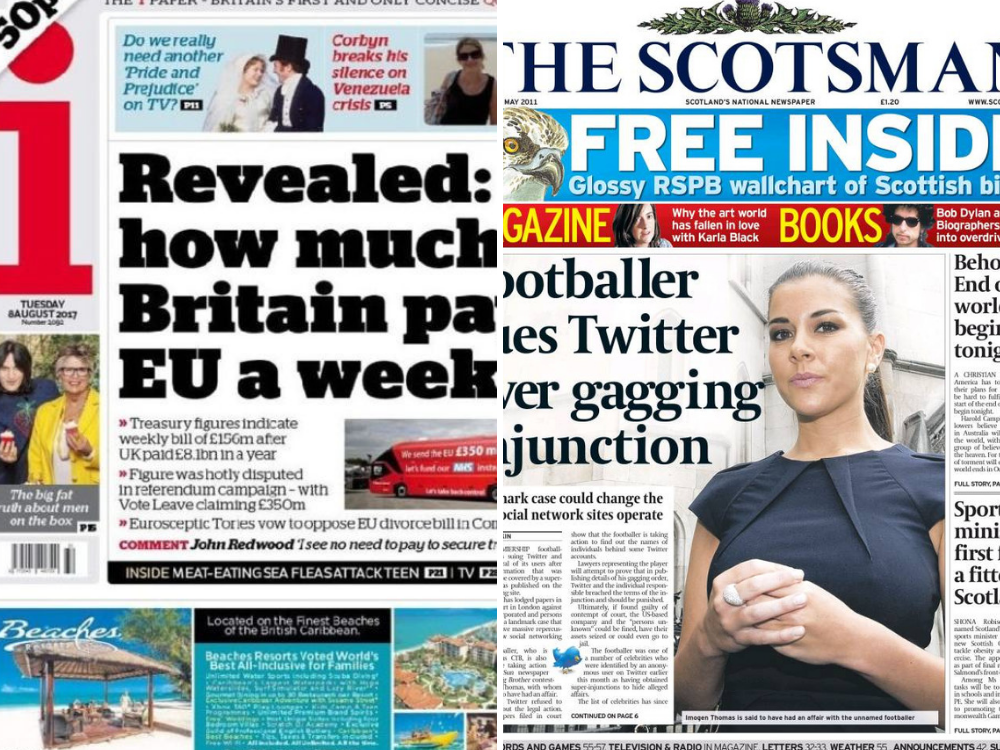
The head of parliament’s pensions committee has criticised Johnston Press for “dumping” its pension liabilities by calling in the administrators just days before it was due to make an £800,000 contribution to the scheme.
Work and Pensions Select Committee chairman Frank Field MP also said there were “serious doubts” about the pre-pack administration deal that saw the publisher bought up by the holders of its £220m debts.
As part of the deal, JP bondholders, acting through newly-formed company JPI Media, agreed to wipe out 60 per cent of the £220m owed to them and extend repayment of the remaining £85m to 2023.
They also said they would inject £35m of new money into the group as part of the pre-pack deal. Press Gazette has since seen an FAQ sent to staff revealing that this sum is a working capital loan.
The loan – effectively a funding pot that can be accessed if needed – has an attached interest rate and must be repaid within two years, according to a JPI Media spokesperson.
The Pension Protection Fund is set to put in a claim of up to £305m over JP’s pension scheme. Its defined benefit scheme was not passed over to the new firm.
In letters responding to questions from Field, the PPF and The Pensions Regulator said JP was due to pay out around £800,000 in pension contributions shortly after administrators were appointed on 17 November.
The PPF said the payment was due on 18 November. TPR claimed it was due on 19 November.
In a statement, Field said: “It doesn’t take a genius to work out that a company that dumps its pensions liabilities just days before it has to put £800,000 into the pension fund might be up to no good.
“It’s clear that the PPF, which is left to foot the bill, has serious doubts about this pre-pack deal. The Pensions Regulator has promised to be quicker and tougher—now would be a good time to start.”
In her letter to Field, PPF chief executive Oliver Morley claimed there was “no indication that the business was cash-flow insolvent and unable to meet its current debts as they fell due”.
She said it had “more than adequate cash reserves” to cover the sizeable pension contribution and “bondholder interest due in December”.
But a well-placed source slapped down the claim, saying that the business was balance sheet insolvent, as noted by courts across the UK, and was thus unable to pay its massive debts.
The PPF added that it had not seen evidence of a “burning platform” supporting the need for a swift pre-pack deal and still did not understand why there was an “apparent rush to complete the pre-pack administration”.
In a statement, a JP spokesperson said: “The decision to place Johnston Press into administration was taken by three independent judges, in three separate legal jurisdictions of the UK, who each approved the directors’ application for administration.
“The directors took legal and financial advice and concluded that there was no alternative courses of action available to the company.
“Although the business was trading profitably, on an operating basis, the conclusion of the Formal Sales Process demonstrated that there was no longer a reasonable prospect of the company finding a way to repay the £220m bond that fell due for repayment on June 1 2019 or otherwise avoiding an insolvency process.
“This meant that the directors came under a legal obligation to petition the relevant courts on an urgent basis. The timing was wholly unconnected to the £800,000 monthly pension contribution the company was due to make.
“The Group has made payments of £55m in respect of the scheme since early 2014. The PPF and the Pensions Regulator were informed of the proposed timing for these applications in advance.”
Regarding the pre-pack administration deal and other offers made for JP during its sale process, the PPF said that, having seen the JP creditors’ report, it “remained concerned” that marketing of the business “may not have adequately flushed out interest in single or batches of titles that may have achieved a better result” for the pension scheme and other creditors.
Five other offers were made for parts of the regional publisher, including a £96m to £120m deal for the group that excluded the i newspaper.
Two further offers were received for the i newspaper, with one bid coming in for £25m and the other £35m.
The final offers were one of £2.5m for the Sheffield Star, Sheffield Telegraph and Doncaster Free Press and another bid of £30,000 for the Observer series and West Sussex Gazette.
In a statement on bids submitted during the sales process, a JP spokesperson said a total of 63 parties were contacted during the formal sales process that led to six offers being tabled, including one for the business as a whole.
“Yet no viable solvent offers were received, with no parties willing to acquire the pension obligations,” they added.
Email pged@pressgazette.co.uk to point out mistakes, provide story tips or send in a letter for publication on our "Letters Page" blog
